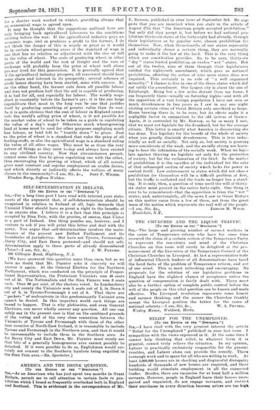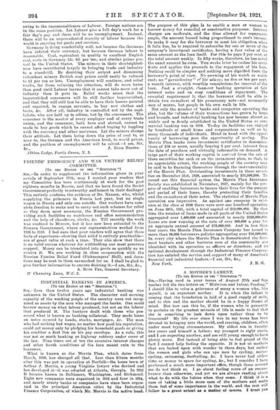RELIEF FOR THE UNEMPLOYED.
[To THE EDITOR OP THE " SPECTAT011."] have read with the very greatest interest the article " Relief for the Unemployed" published in your last issue. I sympathize with the views expressed in it. At the same time I cannot help thinking that relief, in whatever form it is granted, cannot truly relieve the situation. In my opinion. Labour is practically exclusively responsible for the present troubles, and Labour alone can provide the remedy. There is enough work and to spare for all who are willing to work. At least 5,000,000 houses are in shocking and disgraceful disrepair: hundreds of thousands of new houses are required, and their building would stimulate employment in all the connected trades. Besides, there are vacancies for at least half a million servants. However, people in England leave their houses unre- paired and unpainted, do not engage servants, and restrict their purchases in every direction because prices are too high
owing to the unreasonableness of Labour. Foreign nations are in the same position. Let Labour give a full day's work for a fair day's pay and there will be no unemployment. Instead, there will be an unprecedented scarcity of labour because the world is starving for goods and services.
Germany is doing wonderfully well, not because the Germans have inflated their currency, but because German labour is reasonable. Coal, equivalent in quality to excellent English coal, costs in Germany 12s. 6d. per ton, and similar prices pre- vail in the United States. The miners in their shortsighted- ness have contributed largely to bringing trade and industry to a standstill. By doubling their output and dismissing redundant miners British coal prices could easily bo reduced to £1 per ton or less. Unemployment will continue, and relief works, far from relieving the situation, will do more harm than good until Labour learns that it cannot take more out of industry than it puts in. Relief works mean that the impoverished consumers will be still further impoverished; and that they will still less be able to have their houses painted and repaired, to engage servants, to buy new clothes and boots, &c. After all, industry is controlled not by the capi- talists, who are held up to odium, but by the consumers. The consumer is the master of every employer and of every trade union, and the consumer, both here and abroad, cannot be made to buy goods which he cannot afford buying by juggling with the currency and other nostrums. Let the miners change their attitude. Let them bring down the price of coal to, or near to, the German and the American level, to world prices, and the problem of unemployment will be solved.—I am, Sir, &c., J. ELLIS DARKER. Albion Lodge, Fortis Green, N. 2.



































 Previous page
Previous page